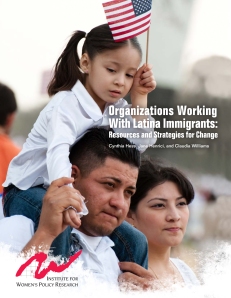The U.S. has often been dubbed the “nation of immigrants” and this is no less true today. However, the face of immigration has drastically changed while policies and practices have failed to adapt. There is a long history of immigrant men seeking opportunity in—well—the land of opportunity by working to provide for families, often left behind in their countries of origin.
No longer is this the singular scenario.
Immigrant women have increasingly sought to reunite their families while also seeking new employment and educational opportunities in the U.S. for themselves. Instead of being met with uplifting and economically empowering opportunities, these women experience disproportionately higher rates of domestic violence, on the job violence, employment discrimination, and sexual exploitation.
At an IWPR release event on March 25 at the Woodrow Wilson Center for the report, Organizations Working With Latina Immigrants: Resources and Strategies for Change, Sara Manzano-Díaz, Director of the Women’s Bureau, U.S. Department of Labor, noted that “comprehensive immigration reform is part of winning the future.” The report notes that, currently, nonprofit organizations and congregations play an integral role in advancing the rights and well being of immigrant families.
In the report, IWPR explored how nonprofits and congregations work with immigrant women, especially low-income Latinas, to better enable them to safely navigate through life in a new, and sometimes hostile, environment. The report notes that although these organizations serve as a vital resource to immigrant women, they face obstacles such as negative public dialogue, restrictive policies and an ever dwindling funding stream which hinder their ability to meet the full needs of immigrant women.
While increasing immigrant women’s access to resources is important, if immigrant women must seek out these resources in a hostile environment, their access will surely remain limited. Of the 280 groups in the study, 120 are involved in some type of advocacy, and seek change a social and political structure which—they feel—deny the rights of immigrant women. Immigrant rights— like women’s rights and human rights—are about preserving personal agency, and allowing space and resources for people to make decisions about their own lives and the lives of their families.
In her presentation at the Wilson Center, Cynthia Hess, Study Director and co-author of the report outlined the wide range of services that nonprofit organizations offer to immigrant women such as English classes, child care, health services, and access to affordable transportation. She noted that, in many cases, religious groups have stepped in to provide services when the government has not, and that a climate of fear—for both documented and undocumented immigrants—may prevent Latina immigrants from seeking services. Fear of being pulled over by the authorities can even lead immigrants to avoid driving.
Perhaps it is a coincidence that IWPR’s report was released on the 100th anniversary of the Triangle Shirtwaist Factory tragedy. Many of the victims of that tragedy were working immigrant women and girls. In the days leading up to the Triangle factory tragedy, women organized around their concerns , protesting and forming unions to protect their interests. However, one well-known factory, The Triangle, refused to recognize these unions and would face tragic consequences as a result.
IWPR’s report, Organizations Working with Latina Immigrants, also shows that there are consequences for ignoring the needs of immigrant women and the challenges they face in trying to earn a living in their adopted country.
Other speakers and panelists at the March 25 launch event included Sonya Michel, Director of the United States Studies program at the Wilson Center; Patricia Foxen, Associate Director of Research at the National Council of La Raza (NCLR); Pierluigi Mancini, Executive Director of CETPA (professional mental health counseling services for the Latino community); Jen Smyers, Associate for Immigration and Refugee Policy with Church World Service; Cecilia Menjívar, Cowden Distinguished Professor of Sociology at Arizona State University; Lydia Guzman, President of Somos America; and, Mary Odem, Associate Professor of Women’s Studies and History at Emory University. Speaking on behalf of IWPR were Heidi Hartmann, President, and co-authors of the report and Study Directors, Jane Henrici and Cynthia Hess.
Mallory Mpare is the Communications Fellow at the Institute for Women’s Policy Research.


